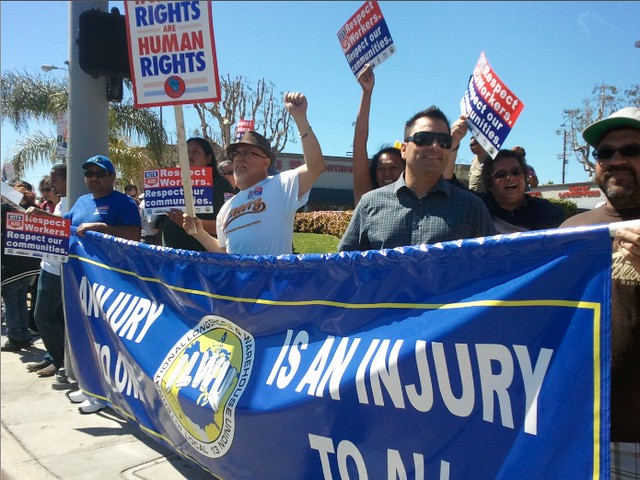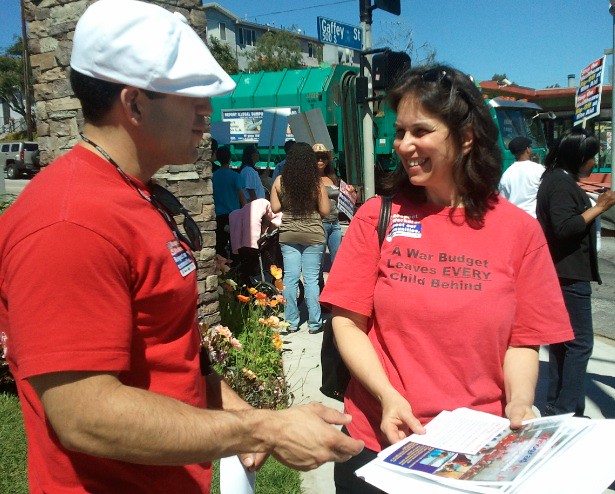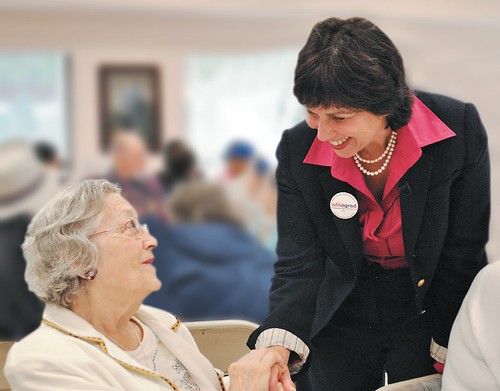 Debra Bowen’s Enron Connections and CA’s $40 Billion+ losses due to Energy Deregulation.
Debra Bowen’s Enron Connections and CA’s $40 Billion+ losses due to Energy Deregulation.
Debra Bowen’s Enron connections & various Energy Company Investments matter to me, to my family, to Venice, to CD36 (Jane Harman’s old seat) and to California. Why? Debra Bowen voted in 1996 to de-regulate the CA energy industry, passing on the costs of the dangerous Diablo Canyon nuclear power plant to the ratepayer. During the energy crisis, when Bowen chaired the Senate Energy Committee, she took money from Enron and refused to support re-regulating the energy industry. She also has invested in and is currently invested in energy company shares (e.g., General Electric & Provident Energy (see below)).
Enron’s donations to Debra Bowen matter because Enron was able to take advantage of Debra Bowen’s SB335 vote and her deregulation and because its entire fortune was built on economic withholding and inflated price bidding in California’s spot markets. Bowen actually has invested in energy cmpanies in the past. She is currently invested in General Electric and Provident Energy (source: Bowen’s Feb. 28, 2011 Form 700 California filing). I’ve been informed by sources that she invested in Enron previously via Mutual Funds but haven’t been able to acertain the truth of this. Still, as a former Energy Chair (while she was a state senator) I don’t think she should be investing in two energy companies (G.E. and Provident Energy)
Further, Bowen has definitely taken donations from Enron, a company that created a phony regional and statewide energy crisis by taking power plants off-line during peak demand. Why is this important? Conflicts of interests due to corporate non-arms length investments. That’s why. During the energy crisis, when Enron manipulated supply, causing rolling black-outs, Bowen told the LA Business Journal (1/2001) she feared re-regulation would negatively impact energy companies. Finally, in 2003, when the state legislature amended a bill to re-regulate the energy industry, Bowen was one of two legislators listed as abstaining or absent.
Bowen’s Enron connections together with her various Senate votes for energy deregulation legislation allowed Enron market traders to sell power 20 times its normal price in scams dubbed “Black Widow” and “Death Star”. Her conflicts of interest helped create the Enron fiasco which cost Californians over $40 Billion dollars. …Please follow below to read more about Bowen’s Enron connections.
Debra Bowen : A former Republican and Enron’s Best Friend in Sacramento.
The result for Californians? $40 to $45 Billion was lost due — at least in part — to Debra Bowen’s deregulation votes & her Senate Energy Chairship’s kowtowing to CA Corporations and to Enron. Debra Bowen’s siding with Enron (and her investments thereto) cost California between $40 and $45 billion (Source: Christopher Weare, // The California Electricity Crisis: Causes and Policy Options. San Francisco: Public Policy Institute of California — 2003). Bowen is a candidate — like Hahn — who is leaving her job before her recently elected term is up and now — like Jane Harman (who she implicitly endorsed) now may trigger elections costing millions of dollars.
Excerpt from the below linked San Jose Mercury News Article (deals w/ Bowen & other Sacramento legislators’ complicity in the $40 billion to $45 billion that CA lost due to Enron):
Excerpt: “…In February, the Senate’s Energy, Utilities and Communications Committee met to discuss the state’s energy prospects.
Bowen, who replaced Peace as chairwoman in late 1998, acknowledged at the hearing that the state’s electricity reserves “are tighter than we would like.” But no comprehensive remedy came out of that session.
Bowen declined to be interviewed, but her chief of staff, Evan Goldberg, said Bowen never raised major concerns about the energy problem with Davis, assuming the state’s regulatory agencies would alert the governor if an emergency developed. Looking back, he said, Bowen believes her failure and that of other lawmakers to act dramatically, and sooner, resulted from “a lack of foresight...”
Marcy Winograd is running for the same Congressional seat that Bowen is. Winograd is the polar opposite of Debra Bowen when it comes to Corporate Fraud and Donations. She has taken no donations from corporations and is an authentic progressive who cannot be brought the way Bowen was.
Debra Bowen rejected SB 335 (3 strikes law equivalent for Corporate felonies) and was one of two Democrats who joined the Republicans in defeating it in 2003.
I believe she did so — at least in part — because Debra Bowen was protecting Enron, a company which eonated and invested in her. Enron invested in Debra Bowen by making campaign donations — on several occasions — to Bowen’s campaign fundraising efforts. Debra Bowen helped them out when they lobbied for deregulation and by voiding SB335 and comparable senate legislation (i.e. by crossing party lines and joining with California’s Republican leaders). Quid pro quo.
It doesn’t take a rocket scientist to see where Debra Bowen’s deeper allegiances, values & loyalties lie.
If you want a corporate tool (a former Republican in Democratic clothing), vote for Debra Bowen. If you want someone who will not allow Corporations to control their vote — vote for Marcy Winograd.
From 1998 through 2000, Bowen reported receiving $4,000 from Enron Corporation. Of the $4,000 Bowen received, $3,000 was given to her before the 2000 election. The following table details Bowen’s contributions from Enron:
CONTRIBUTOR INDUSTRY DATE ELECTION DATE AMOUNT
Enron Corp Energy & Natural Resources N/A 1998 $1,000
Enron Corp Energy & Natural Resources 3/20/2000 2000 $2,000
Enron Corp Energy & Natural Resources 9/7/2000 2000 $1,000
REPORTED RECEIVING OVER $36,000 FROM OIL, GAS COMPANIES (1998-2010)
From 1998 through 2010, Bowen reported receiving $36,750 in campaign contributions from oil and gas companies. The election year that Bowen received the most money from oil and gas companies was 1998, when she reported receiving $12,500.
—–
The following table details Bowen’s contributions from oil and gas companies:
CONTRIBUTOR NAME INDUSTRY ELECTION YEAR AMOUNT
Atlantic Richfield/Arco Oil & Gas 1998 $1,000
Atlantic Richfield/Arco Oil & Gas 1998 $500
Atlantic Richfield/Arco Oil & Gas 1998 $1,000
California Independent Oil Marketers Pac Oil & Gas 1998 $500
Chevron Corp Oil & Gas 1998 $1,000
De Menno-Kerdoon Oil & Gas 1998 $1,000
De Menno-Kerdoon Oil & Gas 1998 $5,000
Pacific Enterprises Oil & Gas 1998 $1,000
Regent International Oil & Gas 1998 $500
Tosco Corp Oil & Gas 1998 $1,000
Williams Companies Oil & Gas 2000 $1,000
Tosco Corp Oil & Gas 2000 $2,000
Atlantic Richfield Oil & Gas 2000 $1,000
California Independent Oil Marketers Pac Oil & Gas 2000 $750
California Service Station & Automotive Repair Association Oil & Gas 2000 $500
Independent Energy Producers Association Independent oil & gas producers 2002 $1,000
California Independent Oil Marketers Oil & gas 2002 $500
Tosco Corp Petroleum refining & marketing 2002 $1,000
Vind, Richard B Oil & gas 2002 $1,000
7-Eleven Gasoline service stations 2002 $500
Independent Energy Producers Association Independent oil & gas producers 2002 $2,000
California Independent Oil Marketers Oil & gas 2002 $750
California Independent Oil Marketers Association Petroleum refining & marketing 2004 $700
Morabito, Paul Oil & gas; President of Baruk Petroleum 2004 $5,300
Morabito, Paul Oil & gas; President of Baruk Petroleum 2006 $5,300
California Independent Oil Marketers Association Petroleum refining & marketing 2006 $700
ConocoPhillips Oil & Gas 2010 $250
===
Poor Decisions, Lack of Action Precipitate California’s Power Crisis
02/19/2001
San Jose Mercury News – California
Key California lawmakers, including governors Pete Wilson and Gray Davis, did little to head off the state’s electricity crisis despite repeated warnings dating back to 1998 that trouble was coming.
Ominous flaws in the system became evident almost immediately after California began its grand experiment to open up the sale of electricity to competition nearly three years ago.
Power reserves were dangerously low. Wholesale prices shot up amid charges that suppliers were manipulating the market. Retail competition was floundering. Major high-voltage lines were plagued with problems and numerous power plants were prone to breakdown. Little attention was paid to conservation.
It was all spelled out in a series of reports and public pronouncements by government experts and others in and out of California. Yet as a group, the people who should have been watching out for the public good were reluctant to take responsibility and slow to respond.
Many experts believe the magnitude of the debacle — which could cost taxpayers at least $2 billion and has left the state’s two largest utilities near bankruptcy — could have been significantly minimized had lawmakers, the governors and their appointees acted sooner.
Just 11 months into the experiment, a key architect of the state’s energy deregulation law — state Sen. Steve Peace, D-La Mesa — complained about price gouging at a legislative hearing and said he feared reliability could be in peril. While remaining a deregulation supporter until well into last year, Peace said he couldn’t understand at the time why others weren’t “screaming bloody murder” about its shortcomings.
Other experts agree, saying elected officials dawdled far too long or didn’t do enough.
High on that list were governors Wilson and Davis, and Senate Republican Leader Jim Brulte of Rancho Cucamonga, who had championed deregulation when he was in the Assembly.
Also included were the heads of the Legislature’s energy committees: Peace and his successor, Debra Bowen, D-Redondo Beach, in the Senate, and Diane Martinez Mandaville, D-Alhambra, followed by Roderick Wright, D-Los Angeles, in the Assembly.
As the energy situation grew into a crisis, Assembly Speaker Bob Hertzberg, D-Van Nuys, and Senate President Pro Tem John Burton, D-San Francisco, also played major roles.
Much of what lawmakers are doing now or proposing — from speeding power plant construction, pushing for substantial conservation, giving the state a stronger oversight role and locking in lower prices through long-term contracts — could have been done more than a year ago. Many of those ideas were discussed at legislative hearings in February 1999 but not acted upon.
Why not? A number of factors were involved:
California was entering uncharted waters by opening up its electricity markets to competition and the way those markets operated was exceedingly complex.
Deregulation created a fragmented system of oversight with no one person or agency in charge.
Some officials who oversaw the initial stages of deregulation left Sacramento after the 1998 election.
Many officials placed too much faith in the assumption that whatever problems emerged
early on in this radically restructured market would work themselves out or that the federal government would fix things.
“Despite the events that were popping up on the radar screen, people went to extraordinary lengths to explain away any problem as an anomaly,” said Loretta Lynch, who joined the Public Utilities Commission in January 2000 and was named president by Davis two months later.
Almost immediately after California’s bold venture into electricity deregulation began March 31, 1998, evidence emerged that the system was beset by severe and potentially catastrophic weaknesses:
The California Independent System Operator (ISO) found power plant construction lagging.
The Power Exchange reported wholesale prices spiking and raised concern about price gouging.
The ISO reported the power grid had major shortcomings.
Then-Gov. Wilson and other lawmakers had assumed that, once power sales were competitive, businesses would flock to California to build more generators and sell electricity. This, in turn, would boost power supplies and lower energy bills. But that didn’t happen.
Some firms were eager to buy the utilities’ plants and were planning to build others. But many of the new generators wouldn’t come on line for years, largely because their operators were uncertain about this new market and proceeding slowly.
As a result, it was clear early on to some experts that electricity supplies would be
severely crimped for several years. This was a problem that had not occurred — at least not in the same way — under the regulated system, because the utilities and the Public Utilities Commission had been responsible for making sure electricity supplies were sufficient and ordering new plants built to meet escalating demand.
Now no one had the responsibility to act.
Based on its analysis of a worst-case scenario, the ISO, which oversees most of the power grid, reported July 14, 1998, that power demand could outstrip supply within a year. That fear was reinforced by a federal study the same year predicting severe shortages throughout the Pacific Northwest, which California relies on for much of its electricity.
The ISO report also found deficiencies in some crucial high-voltage lines — particularly in the Bay Area — and worried about a possible shortage of natural gas, which many plants use for fuel.
The advanced age of many plants was another issue. The report, which was widely distributed in Sacramento, predicted a “significant vulnerability to the system” if some generators stopped working.
As demand for power continued to rise, so did electricity costs.
Under the terms of a temporary rate freeze imposed at the beginning of deregulation, occasional spikes in wholesale power prices were absorbed by the utilities and not passed on to customers. For that reason, most people — including many lawmakers — weren’t aware of what was happening to the market early on. But by mid-1998, it was already overheating.
The trend was detailed in two reports published in August that year by the ISO and the Power Exchange, which auctions wholesale electricity.
They worried that the average wholesale price was nearly twice what it had been in April, when it was $23 per megawatt-hour, and that some electricity was going for as much as $9,999 per megawatt-hour. They also found evidence of price manipulation by suppliers.
It’s unclear which lawmakers saw those reports. But a state official said such studies were usually sent to the Legislature.
With all this evidence in hand, California’s elected officials could have taken steps then to ensure more power was available and prices were kept low.
Experts say those actions could have included speeding up the permit process for new power plants and making provisions to install “peaker” plants, which are small generators that switch on during emergencies. They also could have required the utilities to buy more power in long-term contracts, instead of on the spot market, where wholesale prices were especially high.
All of these ideas are being actively pursued today. Yet in 1998, most people — including members of the media — seemed unconcerned about electricity.
In a recent interview, Wilson said he knew four years ago that the deregulation law he signed “was not a perfect free-market mechanism” and that “course corrections” probably would be needed. But while criticizing his successor for not acting sooner to boost electricity production, among other steps, Wilson acknowledged that he never sponsored legislation to expedite new power plants.
California’s leaders were blase, in part, because of their faith in competition and the belief that whatever glitches appeared in the system would be momentary. They also were preoccupied with the statewide election in 1998, in which the main topics in the governor’s race were public education and health care reform.
Besides, energy was arcane.
“People didn’t pay attention to it because it was too complex,” said Martinez Mandaville, who chaired the Assembly Utilities and Commerce Committee in 1998. “The whole thing was smoke and mirrors.”
Two major factors conspired in 1999 to further divert California’s attention from its looming energy debacle: relatively benign weather that kept electricity demand low and the changing of the guard in Sacramento after the election. Although few people seemed to be listening, alarms continued to sound:
Testimony before the Senate energy committee highlighted insufficient conservation and warned that state oversight was fractured.
A San Diego consumer group predicted residential bills would rise.
The California Energy Commission advised that hot weather could strain system.
In February 1999, a month after Davis took office, the Senate’s energy committee heard from experts who repeated concerns about the state’s aging stock of power plants and unreliable high-voltage lines and bemoaned ineffective conservation efforts. They also complained of turf battles among regulatory agencies with no one clearly in charge.
Some people — including Peace — were particularly worried. Unless the state could ensure a more reliable supply of electricity, “This whole system will last no more than six months” and will need to be re-regulated, he said. “We’ll seize every power plant and turn them over to S. David Freeman,” the chief executive officer of the Los Angeles Department of Water and Power, who had just testified.
The room burst into laughter at the comment, but it was oddly prophetic. Almost two years later to the day, Davis picked Freeman to negotiate long-term power contracts with suppliers as the state began re-regulating its electricity system and lawmakers debated taking over power plants.
Several legislators, including Peace and Bowen, introduced bills in 1999 to promote conservation, streamline the power plant building process and restructure some energy agencies. But much of the legislation was watered down or delayed. For example, one ambitious bill sought to boost conservation through special meters that would encourage customers to use less power when it was in short supply. But as the legislation progressed, it was reduced to a small pilot program.
Most elected leaders still had no clue what was coming.
One reason was that so many key players lacked experience. The membership of the Legislature’s energy committees changed significantly after the election, and Davis had to pick his own people to replace Wilson’s in key energy agencies. Many of these new officials needed time to become familiar with the complicated issues.
Wright, who took over the Assembly’s energy committee in 1999, said it wasn’t the Legislature’s job to worry about details. “We don’t do the day-to-day management of electricity,” he said.
One agency set up by the Legislature to monitor California’s energy needs was the Electricity Oversight Board. But the board went through four chairmen from 1998 through the end of 2000, its role was vague, and its primary function was issuing reports.
Although some might argue the board could have been more vocal about the electricity concerns being raised, its chairman, Michael Kahn, a Davis appointee, disagreed. “We don’t regret anything we did, and there is nothing more we could have done.”
Cooler temperatures in 1999 also tended to camouflage the growing peril. Without much need to run air conditioners, energy consumption leveled off. As a result, authorities that year were forced to declare only one Stage 2 electrical emergency, which happens after available power reserves dip below 5 percent. Because five Stage 2 alerts had been issued the year before, that seemed to suggest the situation was improving.
But all was not well.
Concerned about additional evidence of suppliers driving up prices, the Power Exchange concluded on March 9, 1999, that the trend could cause “more severe episodes of high prices in the future.”
Then, in July 1999, the California Energy Commission warned that an unseasonably hot summer could push power reserves to their limits.
One group that was growing nervous was the Utility Consumers’ Action Network, a consumer organization in San Diego, where the retail electricity rate freeze already had been lifted for customers of San Diego Gas & Electric Co.
In August, it issued a study warning that the area’s growing demand for power — coupled with California’s tightly constrained high-voltage and natural gas lines — “will lead to higher, not lower, electric costs for San Diego.”
In response, the California Public Utilities Commission held a hearing a few months later in San Diego. Yet little came of it.
“As I recall those meetings, it was pretty clear . . . there were going to be problems,” said Richard Bilas, the commission’s president for most of 1998 and 1999. But, he said, no one acted on the predictions because “It was a matter of let’s wait and see what really is going to happen.”
In retrospect, Bilas wonders whether he might have done more. “Perhaps I was a little remiss in not taking the bull by the horns.”
Even in 2000, the state’s elected leaders still had a chance to act. More warnings were issued:
The California Energy Commission urged conservation.
Experts called longer-term power contracts essential.
PG&E and Southern California Edison claimed they were headed for bankruptcy.
Federal officials offered limited help.
In February, the Senate’s Energy, Utilities and Communications Committee met to discuss the state’s energy prospects.
Bowen, who replaced Peace as chairwoman in late 1998, acknowledged at the hearing that the state’s electricity reserves “are tighter than we would like.” But no comprehensive remedy came out of that session.
Bowen declined to be interviewed, but her chief of staff, Evan Goldberg, said Bowen never raised major concerns about the energy problem with Davis, assuming the state’s regulatory agencies would alert the governor if an emergency developed. Looking back, he said, Bowen believes her failure and that of other lawmakers to act dramatically, and sooner, resulted from “a lack of foresight.”
When the committee’s hearing continued into March, William Keese, chairman of the California Energy Commission, urged the state to take precautions against possible power shortages. Among other action, he proposed an ad campaign to promote conservation.
Keese said he saw little urgency among the legislators and they didn’t pursue the ad campaign.
“There wasn’t the interest,” Keese said. “If I have any regret, it’s that I just didn’t yell loud enough at the time.”
Senate Republican Leader Brulte insisted that lawmakers were paying attention. “There was clearly a growing concern in the Legislature early last year that there were problems,” he said.
But when asked why significant remedies weren’t addressed earlier, Brulte declined to “get into the blame game” because “there will not be a banquet table large enough for everyone who has to sit down.”
By summer in San Diego, with the rate freeze lifted, retail bills for residents and businesses tripled. Nothing like that happened in the Bay Area, where the freeze remained in place. Still, this area was about to have problems of its own.
On June 14, 2000, record temperatures and high-voltage line constraints resulted in rolling blackouts to nearly 100,000 homes and businesses.
That finally caught Davis’ attention. He ordered Lynch of the Public Utilities Commission and Kahn of the Electricity Oversight Board to investigate. Meanwhile, another problem was developing: The effect all this was having on PG&E and Edison.
Those companies were beginning to absorb huge losses because they couldn’t pass on soaring wholesale power costs to their customers. Both utilities have been criticized for failing to acknowledge their own plight sooner. And the state apparently didn’t monitor it closely.
Although the Public Utilities Commission is supposed to keep an eye on the finances of utilities, officials with that agency recently told lawmakers that under deregulation, its audit staff was trimmed so much it couldn’t properly keep tabs on the firms.
To help cut their costs, PG&E and Edison asked the commission on July 22 for permission to buy power from suppliers in long-term contracts instead of the increasingly expensive spot market. The agency agreed in August and the utilities signed some contracts in October. Why they didn’t sign more is in dispute. PG&E claims the commission didn’t set clear rules for the contracts, but others say that shouldn’t have stopped the utilities.
Most experts now say the failure to lock up power in long-term contracts was a mistake, especially since some suppliers sounded willing to enter into such deals then.
On July 31, Duke Energy wrote Davis offering to sell 2,000 megawatts of electricity at 5 cents per kilowatt-hour for the next five years. But Duke officials say they never heard back from the governor and the offer expired. Davis’ spokesman, Steve Maviglio, recently explained that the governor considered the price too high at the time.
Six months later, Davis’ plan to rescue California hinges largely on having the state buy power through just those types of long-term contracts. Only now, the state will be lucky to get 6 cents per kilowatt-hour.
After receiving an August report from Kahn and Lynch which declared the state’s “electrical system in trouble,” Davis and the Legislature approved some modest measures to speed up power-plant licensing and conserve energy. And they passed a rate freeze for San Diego residents.
However, Davis declined a request by Republicans to call a special legislative session on energy issues, saying he wanted the fall to consider his options. Eager to keep the issue out of election-year politics, legislators passed a resolution declaring that high electricity costs “are threatening the economic well-being of California consumers and businesses” — and then went home until January.
Davis and other state officials focused on trying to get the Federal Energy Regulatory Commission to impose wholesale price caps across the West and to obtain refunds from power suppliers, whom the governor and others accused of price gouging.
It was a futile effort. The federal agency repeatedly refused. Yet, the state kept asking while conditions steadily worsened.
In September, natural gas prices more than doubled. Also that month, the utilities began complaining that their wholesale power bills were leaving them billions of dollars in debt.
At the same time, predictions of power shortages throughout the Pacific Northwest began coming true. Because of low water levels in dams, much of the hydroelectric power that California depended on wasn’t available.
On Dec. 16, Davis announced a special legislative session to combat the crisis. By then, events had spiraled out of control.
“Believe me, if I wanted to raise rates I could have solved this problem in 20 minutes,” Davis said Friday afternoon. “But I am not going to ask the ratepayers to accept a disproportionate burden. So we’ve had to take the route we’re taking.”


 Repeating
Repeating 
 The last week of a campaign, as our mailbox fills to overflowing with glossy brochures extolling the virtues of competing candidates, we often find ourselves donning black, rending our garments, and contemplating the death of a million innocent trees.
The last week of a campaign, as our mailbox fills to overflowing with glossy brochures extolling the virtues of competing candidates, we often find ourselves donning black, rending our garments, and contemplating the death of a million innocent trees.





